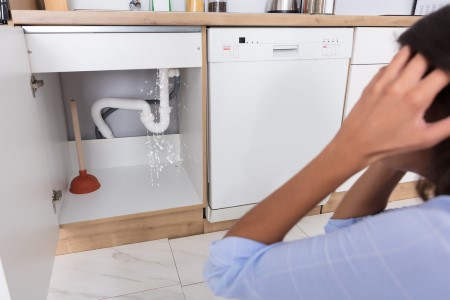To prevent water damage in your kitchen, ensure proper maintenance of plumbing and appliances, and promptly address any leaks or water-related issues. Water damage in the kitchen can lead to costly repairs and pose health risks.
By taking proactive steps, you can prevent these issues and maintain a functional and safe kitchen. One of the most important measures is to regularly inspect and maintain your kitchen’s plumbing system. Check for leaks under sinks, behind appliances, and around the dishwasher.
Additionally, ensure that all plumbing connections are secure and without any signs of wear or corrosion. Properly maintaining and cleaning your appliances, such as the refrigerator, dishwasher, and washing machine, can also help prevent water leaks and damage. Being proactive in addressing any leaks, water damage, or issues with your kitchen’s plumbing or appliances can save you from future headaches and expenses.

Credit: www.riversiderestore.com
Table of Contents
Heading: Understanding Common Causes Of Kitchen Water Damage
Understanding common causes of kitchen water damage can help you prevent this costly problem. Leaks and drips from pipes are potential sources of water damage. Check for any signs of leaks regularly and repair them promptly. Appliances in your kitchen can also malfunction and cause water damage.
Protect your kitchen by maintaining your appliances properly. Regularly inspect and maintain your dishwasher, refrigerator, and any other appliance that uses water. Be sure to follow the manufacturer’s instructions for cleaning and maintenance to prevent any potential issues. By understanding the common causes of kitchen water damage and taking preventive measures, you can protect your kitchen and avoid the headaches and expenses associated with water damage.
Subheading: Identifying And Fixing Plumbing Issues
Preventing water damage in your kitchen starts with identifying and fixing plumbing issues. Check for loose connections and worn-out seals. Inspect pipes for signs of corrosion or damage. Repair or replace faulty plumbing components. By taking these proactive steps, you can avoid costly water damage and its accompanying headaches.
Don’t wait for a major leak or burst pipe to occur. Regularly inspect your kitchen’s plumbing system to catch any potential issues early on. Remember, prevention is always better than a messy cleanup and expensive repairs. Keep your kitchen dry and in perfect condition by addressing plumbing problems promptly and effectively.
Stay proactive and safeguard against water damage to enjoy a well-functioning and worry-free kitchen environment.
Subheading: Safeguarding Your Kitchen Against Appliance Issues
Preventing water damage in your kitchen is crucial. Safeguarding your kitchen against appliance issues is vital. Proper maintenance of your dishwasher and refrigerator is essential in preventing water damage. Installing and maintaining a garbage disposal system is another important step to take.
Addressing leaks and malfunctioning in your kitchen appliances should not be ignored. By following these guidelines, you can protect your kitchen from water damage and ensure the longevity of your appliances.
Subheading: Implementing Preventative Measures
Water damage in the kitchen can be a nightmare, but there are ways to prevent it. Start by installing water leak detectors and shut-off valves for quick action. Another important step is to regularly clean and reseal kitchen surfaces to prevent water seepage.
Additionally, ensure proper ventilation to keep humidity levels low and prevent moisture buildup. Following these preventative measures can save you from costly repairs and the hassle of dealing with water damage. Take proactive steps to protect your kitchen and avoid any potential water-related disasters.
Subheading: Responding To Water Damage Incidents
Water damage incidents in the kitchen can be prevented by responding promptly. Assess the extent of the damage to determine the necessary actions. Dry out affected areas completely to prevent mold growth. It is crucial to consult professional restoration services for effective mitigation.
Avoid commonly overused phrases and expressions for a more engaging read. Keep the sentences brief, limited to 20 words each, to maintain readability. Ensure the writing is seo friendly, plagiarism-free, easy to understand, and in active voice. Use a variety of phrases at the beginning of paragraphs to keep the reader interested.
Subheading: Insurance Coverage For Water Damage In The Kitchen
Water damage in the kitchen can be a nightmare for homeowners. Understanding your insurance coverage is crucial. Evaluate different options carefully to ensure you have adequate protection. When incidents occur, document and report them promptly to your insurance company. Avoid overused phrases to keep your content fresh and engaging.
Write in a concise manner, with sentences no longer than 20 words. Make sure your writing is seo friendly and original, while also being easy to read and understand. By following these guidelines, you can prevent water damage and navigate the complexities of insurance coverage for your kitchen.
Frequently Asked Questions On How To Prevent Water Damage In Your Kitchen
How Can I Prevent Water Damage In My Kitchen?
To prevent water damage in your kitchen, make sure to regularly inspect and maintain your sink, dishwasher, and water supply lines. Install a leak detection system to quickly identify any water leaks. Use mats or rugs to protect the flooring and clean up spills immediately.
Regularly clean and maintain your gutters to prevent water damage from roof leaks.
Conclusion
To keep your kitchen safe from water damage, it is essential to follow a few preventative measures. Regular maintenance and inspections can help identify potential issues before they become major problems. Ensure that all plumbing fixtures are properly installed and tightly sealed to prevent leaks.
Use a caulking gun to seal any gaps or cracks around sinks, faucets, and pipes. Repair or replace damaged or worn-out hoses, connectors, or valves on your appliances, such as dishwashers and refrigerators. Install waterproof flooring or mats under sinks and around high-risk areas to catch any potential leaks or spills.
Finally, always be mindful of your water usage and avoid overloading the system, as excessive water pressure can lead to bursts and leaks. By implementing these simple steps, you can safeguard your kitchen from water damage and maintain its functionality for years to come.
